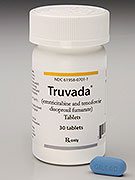- Could Your Grocery Store Meat Be Causing Recurring UTIs?
- Are You Making This Expensive Thermostat Error This Winter?
- Recognizing the Signs of Hypothyroidism
- 10 Strategies to Overcome Insomnia
- Could Artificial Sweeteners Be Aging the Brain Faster?
- Techniques for Soothing Your Nervous System
- Does the Water in Your House Smell Funny? Here’s Why
- Can a Daily Dose of Apple Cider Vinegar Actually Aid Weight Loss?
- 6 Health Beverages That Can Actually Spike Your Blood Sugar
- Treatment Options for Social Anxiety Disorder
HIV Prevention Drug Truvada Might Lower Genital Herpes Risk, Too


A combination drug used to treat and prevent HIV — Truvada — may have an additional benefit: lowering the risk of a genital herpes infection, a new study suggests.
Researchers found that African heterosexuals who were at risk of getting HIV from their partners were about 30 percent less likely to get infected with genital herpes if they took the drug tenofovir alone or with emtricitabine. Truvada is made from the combination of these two drugs.
The study isn’t likely to lead physicians to use tenofovir — alone or in combination with emtricitabine — solely to prevent herpes, one infectious-disease specialist said.
“No one is going to use tenofovir specifically to reduce herpes. There are some side effects and the drug is not cheap. It will only be used as prevention for HIV — not herpes — for high-risk people,” said Dr. Myron Cohen, associate vice chancellor for Global Health at the University of North Carolina School of Medicine in Chapel Hill, who’s familiar with the new research.
Still, “it is beneficial that oral tenofovir can reduce the risk of acquiring genital herpes as well as HIV,” said study lead author Dr. Connie Celum, director of the International Clinical Research Center at the University of Washington, especially considering that genital herpes boosts the risk of HIV infection.
Previous research from the U.S. Centers for Disease Control and Prevention has suggested that the use of Truvada, along with other preventive measures such as consistent condom use, can cut the risk of HIV transmission by as much as 90 percent.
The current study is part of research initially launched to gain a greater understanding of how tenofovir can be used to prevent HIV infection. HIV and herpes infections often occur together. And previous research suggested that a vaginal gel made with tenofovir could cut the risk of genital herpes by about 50 percent, according to background information in the new study.
That led the researchers to wonder if oral tenofovir alone or as part of Truvada could help prevent herpes infections, too.
The type of herpes the researchers looked for in this study was herpes simplex 2 (HSV). This type of herpes is a common cause of genital herpes, according to the CDC. Herpes simplex 1 is another type of herpes, and it commonly causes cold sores, according to the CDC.
The new study tracked almost 1,500 adults who randomly received tenofovir, tenofovir with the AIDS drug emtricitabine (Truvada), or a placebo. None of the study participants had HIV or herpes simplex 2 when the study began. Researchers monitored the participants from the initial enrollment period of 2008 to 2010, until 2011.
The risk of getting herpes simplex 2 was reduced by 24 percent for those taking tenofovir alone, and by 36 percent for those taking the Truvada combination, compared to those taking placebo.
Those results aren’t strong enough to warrant the use of tenofovir alone or in combination solely for herpes prevention, according to Cohen. He added that tenofovir “is not designed to reduce herpes acquisition.”
So why does it matter if tenofovir prevents genital herpes? Because it’s a very common infection and can pave the way for other medical problems.
“About 20 percent of adults in the U.S. have genital herpes infection, and about 50 percent of adults in Africa,” study lead author Celum said. “Previous studies have indicated that genital herpes increases the risk of becoming HIV-infected by about two-fold.”
The cost of the tenofovir combination drug is about $100 a year in Africa and $1,000 per month in the United States, she said.
The next step for research is to determine if tenofovir can provide protection against HIV and herpes when administered through vaginal and rectal gel and in a vaginal ring, she said. Researchers also want to know if the drug can prevent people with HIV from getting herpes.
As for cold sores — herpes simplex virus 1 — she said tenofovir may have an effect on it, too. Previous research using tenofovir in a vaginal gel reduced the risk of both herpes simplex 1 and 2.
The study is in the July 1 issue of the Annals of Internal Medicine.
More information
For details about genital herpes, try the U.S. Centers for Disease Control and Prevention.
Source: HealthDay
Copyright © 2026 HealthDay. All rights reserved.










